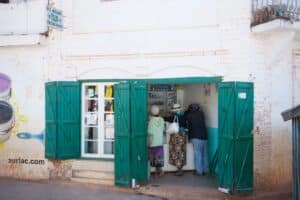Catalyzing Knowledge to Action: Building Better Supply Chains

Photo Credit: Lan Andrian/GHSC-PSM
Supporting USAID’s Largest and Most Complex Project
According to the World Health Organization, nearly two billion people worldwide have no access to essential medicines, causing needless suffering and death from diseases that are either preventable or curable. The USAID Global Health Supply Chain Program-Procurement and Supply Management (GHSC-PSM) project works to provide people around the world with an uninterrupted supply of health commodities for HIV/AIDS, malaria, family planning and reproductive health, maternal and child health, and COVID-19. With a ceiling of US$ 9.5 billion, GHSC-PSM, USAID’s data-driven approach to transformative solutions in procurement and logistics, technical support, and global collaboration has had groundbreaking results across 70 countries worldwide.
Panagora Group, as a subcontractor to the Chemonics-led GHSC-PSM consortium, plays a pivotal role in the success of this project—USAID’s largest and most complex—by designing and establishing the communications and knowledge management component. GHSC-PSM has hundreds of staff worldwide. Our team—currently numbering 16 full-time staff and 18 short-term consultants—has had an outsized impact on the success of USAID’s largest project.
Building Global Platforms of Knowledge
Health systems strengthening requires getting the right information to the right audiences to steer policy and program development, improvement, strategic planning and advocacy. Information must be packaged and disseminated across stakeholders to inform, educate, and drive evidence-based decision making. Panagora’s flagship communication and knowledge management product is the GHSC website, which serves eight complementary projects. The website hosts a prolific resource library with a robust search engine organized by resource type, global health area, and supply chain topic. The website provides an expansive body of information about key initiatives falling under GHSC, including success stories, program news and highlights, critical topics on the work done by GHSC-PSM, and essential information for contractors and vendors.
Lan Andrian/GHSC-PSM
Recognizing the vital role social media plays in telling the story of international development, Panagora identified the appropriate social media platforms to engage global audiences, choosing LinkedIn and Twitter (now X). On GHSC-PSM’s LinkedIn page, Panagora engages audiences with informative and insightful webinars such as Leveraging Technology for Public Health Supply Chain Improvement, highlighting Ghana’s state-of-the-art logistics management information system (GHILMIS). Understanding that posts with visual content get the most engagement on social media, we spearheaded the project’s use of video, audio clips, and motion graphics. The team coached country directors and other key staff to write and post informative LinkedIn articles. The project’s LinkedIn account has 17,400 followers and Twitter (X) has 3,200 followers with a steady growth trajectory.
Our global platform for knowledge management coordinates the project’s engagement at international conferences, including organizing multiple satellite events, which showcase impact and results. These successful efforts include conferences of the International AIDS Society, African Society for Laboratory Medicine, American Society for Tropical Medicine and Hygiene, and International Conference on Family Planning.
Catalyzing Knowledge to Action
Panagora’s communication and knowledge products for GHSC-PSM are developed and disseminated to strategic audiences to serve as catalysts for action in the delivery of essential medicines and commodities. For more than 30 country programs worldwide, Panagora has produced and widely disseminated an extensive portfolio of technical briefs, impact briefs, success stories, photos, fact sheets, and videos that have received both praise and awards from USAID Washington and USAID missions. The expansive range of topics covered provides key stakeholders the resources needed to achieve the project’s goal. The topics include last-mile availability of health commodities, activity-based costing, outsourcing logistics to the private sector, laboratory network optimization, decentralized drug distribution, and recovery strategies for public health supply chains following pandemics as well as other catastrophic events.
The launch of two regional newsletters—a first for Southern Africa and now for West Africa—presented an opportunity for a two-pronged approach to GHSC-PSM storytelling. The newsletters include richly informative narratives and compelling photos from individual countries as well as stories that reflect a regional perspective. Best practice in one can hold the key to a solution in a neighboring country. country can be adapted to fit the context of a neighboring country. For example, a USAID mission added advanced analytics to its annual technical assistance budget after reading a story on the topic from another country. An added value to the regional newsletters is catalyzing a collaborative workflow culture resulting in building communities of practice that model excellence in photography and storytelling. By encouraging every country office to share each issue of Southern Pulse and Western Pulse with their local audiences, we also promote learning in audience identification and strategy.
Every project employee is a communicator, particularly on teams where there are no dedicated resources for communications. Panagora built a project-wide community of practice, which included KMC points of contact, including monitoring and evaluation staff, technical advisors, office managers, and country directors. Using evidence-based adult learning strategies, Panagora delivered training on storytelling, writing, photography, USAID branding compliance, and more. Through webinars, news bulletins, ‘knowledge bites,’ and one-on-one mentoring we helped build an impressive library of strategic resources to enable country programs to document their impact and support USAID’s communications objectives. Panagora now provides knowledge management communications staff for many of the country offices, including Ethiopia, Guinea, Haiti, Mali, Nigeria, Rwanda, and Zambia.
Riccardo Gangale/VectorWorks, Courtesy of Photoshare
Driving Impact through Knowledge
Communications and knowledge management are essential to overall project success. Beginning with a comprehensive communications and knowledge management strategy, a strategic distribution of information among internal and external project stakeholders charts a path to individual and project learning—key drivers of GHSC-PSM project success. Using cutting-edge technologies and platforms, Panagora Group develops and disseminates the right information to the right people to help build stronger, more resilient public health supply chains.